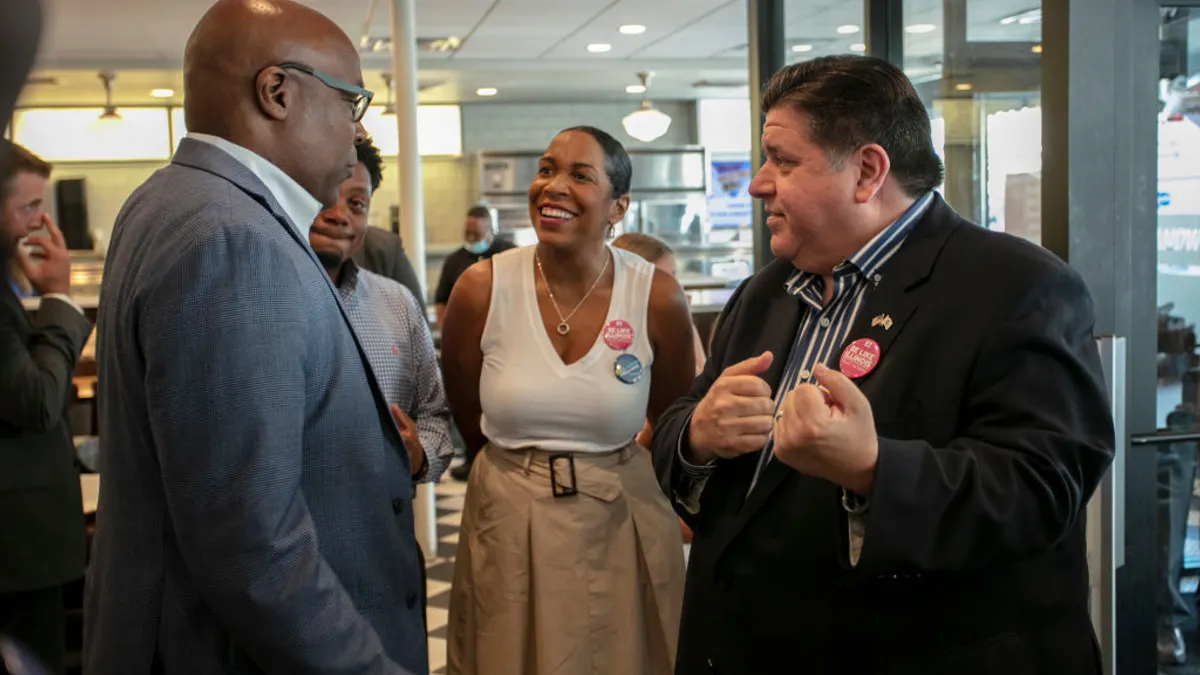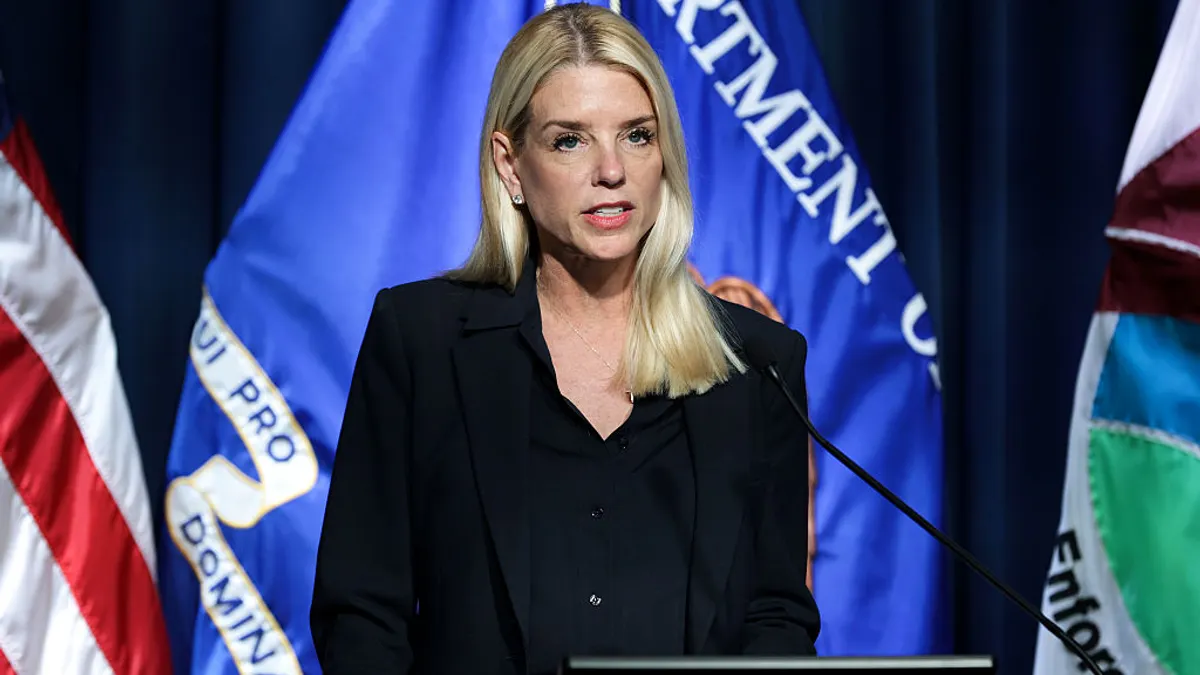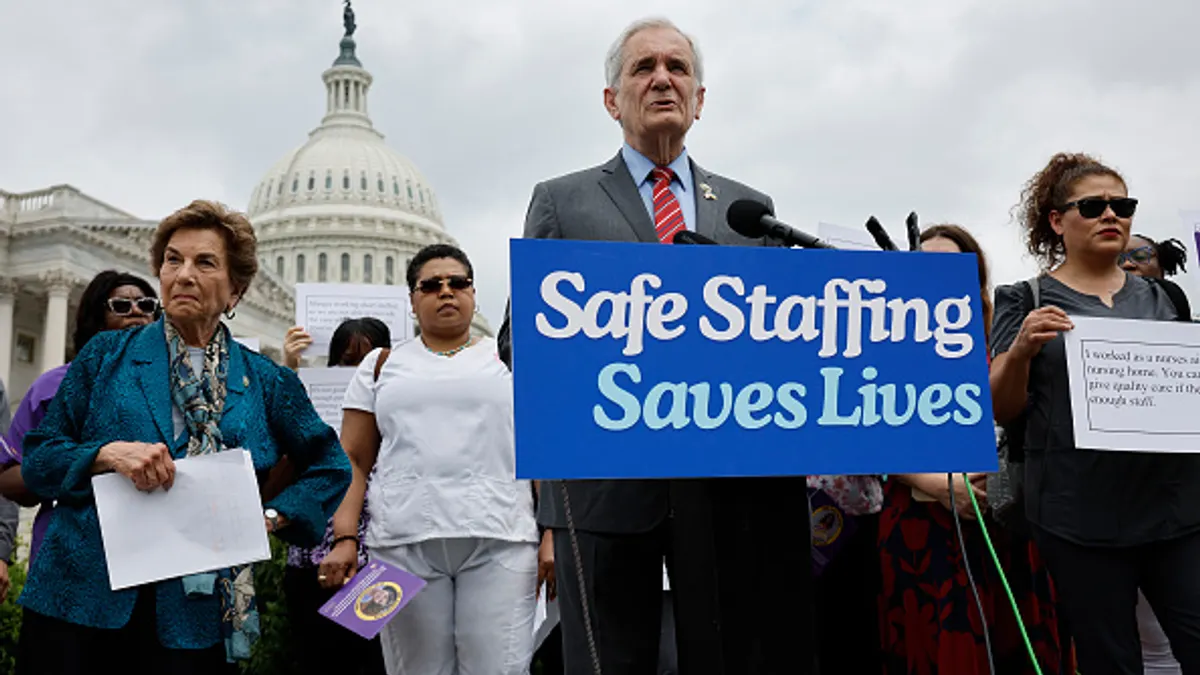What makes LGBTQ+ workers stay?
For diversity, equity and inclusion-minded employers, answering this question is crucial work: A June 22 report from Deloitte suggested that 1 in 3 LGBTQ+ workers are actively looking for a new job. The main draw is an employer that is more inclusive. In conversation with PwC, HR Dive found a case study of a company that is looking to win the war for LGBTQ+ talent. Spoiler alert: it goes far beyond Pride month, which is celebrated in June in the U.S.
This is how PwC Wellbeing Leader DeAnne Aussem describes her company’s pro-gay and pro-trans efforts, which take place the other eleven months of the year.
Trans-inclusive benefits
Aussem described the benefits as being both “very tangible financial benefits, as well as more community-based, inclusion network benefits.”
Concretely, the company offers LGBTQ+ inclusive family planning benefits and medical care. Aussem told HR Dive she and her wife have used PwC-provided fertility benefits. “We've got some really interesting benefits there, whether we're talking about the purchase of donor eggs or donor sperm for same-sex couples or others who might be trying to start or grow a family,” Aussem said. “Again, just considering some of the things we need to go through that maybe others don't.”
Gender-affirming medical care, provided by PwC, has been available since 2013.
Additionally, paid time off has been expanded to include transitioning, along with parental and caregiver leave.
Safe spaces
Like many companies, PwC has employee resource groups for parents, people of color and other marginalized groups. It’s important, Aussem said, because “[w]hen people do have that space to authentically share who they are and how they feel, it makes our culture of belonging stronger.”
Shine, the LGBTQ+ resource group or “inclusion network” as PwC calls it, launched in the mid-2000s and now has more than 3,300 members across the U.S.
Aussem explained that, within the group, the TransFam and non-binary community are also strongly represented. “That group regularly connects to share experiences, provide additional support to one another and help allies become better allies,” Aussem said.
Min Matson, Director of Consulting Solutions for PwC’s Workforce Transformation practice, told HR Dive that participating in TransFam has been great for him. “There’s nothing more powerful than helping others feel seen, valued and that they’re not ‘the only one’ in the room,” he said via email.
When asked about tangible ways employers can show up for trans workers, especially at a contentious political moment, Aussem pointed to what PwC did for Transgender Day of Visibility in March. Shine hosted an event centering the stories of trans and gender non-conforming employees. (She talked about how involvement in the event extended from the resource group itself to the CEO and chairman, Tim Ryan; the tone for DEI, she said, has to be set by leadership, from the top down.)
“We got great feedback, not only from those who were spotlighted with their stories and asked to share — which of course they were a little bit nervous at first. This is an open session, and you never know who's going to show up or how many. But again,” she continued, “we really try to provide those safe spaces for our folks.”
Data shows that the push to create safe workplaces for LGBTQ+ individuals is worthwhile. For one, a landmark report by Human Rights Campaign confirmed that many queer workers face discrimination, sexually inappropriate remarks and general harassment in the workplace — with 45% of respondents saying that enforcement of their company’s non-discrimination policy is dependent on “their supervisor’s own feelings” toward LGBTQ+ people.
Additionally, one in five respondents said they avoid events such as work lunches, happy hours and holiday parties, with one in four avoiding certain co-workers — and one in five saying their unwelcoming environment prompted them to search for a new job. HRC released its “A Workplace Divided’ report in 2018; compare that to Deloitte’s 2023 report, which finds that one in three LGBTQ+ workers are now searching for more inclusive employers.
For PwC, that inclusion is fostered not just by leadership, but laterally: Something that Aussem repeatedly emphasized is that Shine is “not just for members who might identify as part of that community, but also for allies.” She explained that the resource groups are a means of fostering allyship both within the LGBTQ+ community and beyond.
Data collection
“The other thing that we do here at PwC, which might come as no surprise, is we collect data, “ Aussem said. “We love data.”
Data collection surrounding DEI and how people identify is all voluntary, she explained.
“We have many different forms of surveys that allow our people to self-identify. We tried to be as broad and inclusive in language [as possible], to offer as many options that would really meet anybody where they're at,” she said.
Collecting internal data has paid off; for example, Aussem noted, PwC saw an increase in folks identifying as having a disability. When it comes to LGBTQ+ workers, veterans and other underrepresented groups, PwC is “very interested in knowing as much as we can to provide the best possible support,” she said. “ The more we can listen, the more we can offer avenues of support and community-building. That is absolutely something that employers can and should do.”
Staff training
“The last thing I'll say is we can’t underestimate the importance of training,” Aussem added, explaining that the company launched an “inclusive mindset” badge for PwC workers last year.
“That's really aiming to help all of our PwC professionals build and practice inclusive mindsets and behaviors that foster trust. [These] are really critical to bringing out not only the best in our people, but ultimately our teams, so that we can serve our clients,” she said.
Overall, PwC’s approach to culture is three-pronged — training, what Aussem called “candid conversations” and veritable benefits. “That, again, comes with the values that we espouse around caring and working together, and reimagining what's possible,” she said.“It really has moved the needle on our culture becoming an even stronger culture of inclusion and belonging.”





















